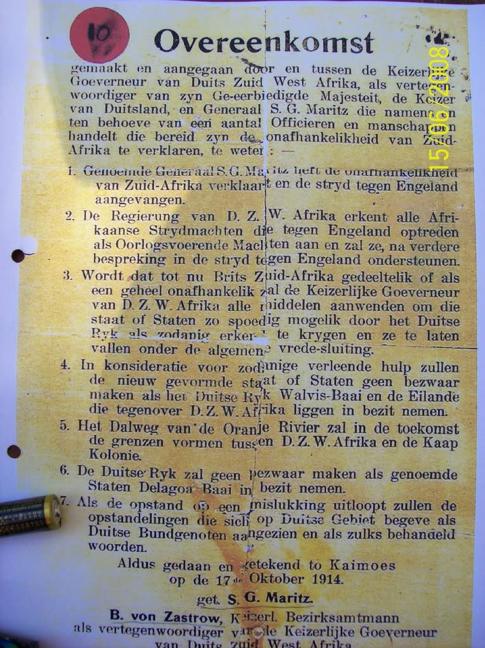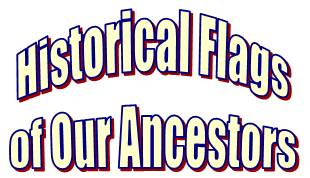1914 Germany Afrikaner farmer Agreement
thank you Etienne
translated from Afrikaner to English
To all the people of the white race all over the world, most of all to the German nation:
This is an important agreement Concerning the South African Boer people and the German nation. It has to do with an agreement between the Boer rebellion and the German troops in Southwest Africa.
The Boer rebellion were lead by leaders of the Afrikaaner nation (General Manie Maritz, General SG Maritz, General Koss Delarey) and who’ll be fought against the English in the Second Anglo-Boer war from 1899 to 1902, where the Afrikaaner nation under hun president In Paul Kruger ulcers completely humiliated by the English when ze ulcers forced to sign the Treaty of Vereeniging in 1902.
The atrocities committed against the Boers in the Concentration camps ulcers horriffic to say the least, and at least 30 000 Boer women and Children Were driven from hun farms Which Were torched under Lord Kitchener’s Scorched Earth policies. The attached files are an image of the original agreements drawn up by the Boer Rebels and the German officials of German Southwest Africa (english version below), as well as an important copy of the book ‘Voice of a Prophet has written about an important clairevoyant (hurt), called Nicolaas van Rensburg, who had Received the gift of prophecy, and loveable to make astonishing Predictions about the future of the Afikaaner Boer nation in South Africa:
In the point is that the agreement was made between the Germans and the Boer rebellion since the Boer rebellion in 1914 did not want to wage war against the German nation, unlike the leaders of the South African Union, Jan Smuts and Louis Botha, who had decided to side with the English against Germany, ihb German South West Africa, and in diong so had effectively stabbed the Germans in the back.
The significance of the agreements made in 1914, is dat the German nation will bieden In the Afrikaaner Boers in any future conflict That nov punctures, and That are the Boer nation of South Africa would do everything in their power to assist Germany in the future in regaining sovereignty over the territory Known today as Namibia, or South West Africa.

The onus was on the goverment of South Africa in 1990 to approach Germany and give them the option of having Southwest Africa Placed under hun control again, but Germany was completely ignored about this, and up to this day there is bitter resentment on the side of the German nation Regarding Southwest Africa.
Afrikaners fear post-Mandela ‘night of the long knives’
GUARDIAN NEWS SERVICE
Dirk Smit’s reaction to the death of Nelson Mandela, it would be fair to assume, puts him in the minority of South Africans. “Sort of indifferent, to be honest,” he said flatly of his feelings. “Calling him a terrorist was a fair comment. What we shouldn’t forget is that he also killed a lot of people. The bombings and all that crap.”
Early Colonial Flags of South Africa
The Republic of South Africa is a country located at the southernmost tip of Africa. It became a stopover point on the spice route between the Europe and the Far East. In 1652, the first formal city of Cape Town was established by the Dutch. The discovery of diamonds in 1867 and gold in 1886 spurred the interest of other European powers and soon the natural wealth of the area and the resulting immigration intensified the subjugation of the native inhabitants.
South Africa’s whites-only town, OraniaWELCOME to Orania, South Africa: a whites-only enclave established in 1991 during the dying years of apartheid.The town in the sparsely populated Karoo region is inhabited only by Afrikaners.
These descendants of Dutch-speaking migrants who arrived in South Africa in 1652 with Jan van Riebeeck, now make up six percent of the “Rainbow Nation’s” population.
But they make up 100 per cent of rural Orania.
It was the Afrikaners who formed the backbone of the National Party that introduced apartheid, and many South Africans regard Orania’s residents as little more than latter-day bittereinders – term used for Boer War holdouts – who rage against today’s majority rule.
Perhaps ironically, Orania’s existence is protected under article 235 of South Africa’s Constitution which ensures right to self-determination.
The legislation was adopted after the end of apartheid, following years of fighting against the system of separate homelands for native blacks.
“This republic is growing,” proclaimed Quintin Diederichs, a former rugby player who became a resident three years ago.
“We have fifty companies that we have created with our own hands,” said Diederichs.
But beneath the seemingly safe and secure environment lurks paranoia, some residents believe that one day blacks might turn against them.
A waiter at a bar said that he fears “black South Africans will kill all white people” when peace icon Nelson Mandela dies.
The 94-year-old who was jailed by the apartheid regime became the country’s first black president in 1994.
Upon his release from prison in 1990 he preached reconciliation and non-racialism.
Orania is probably not what the revered statesman envisaged for a new South Africa.
Read more:
To criticise Mandela in these days is a subversive act, as politically contrarian as declining to wear a poppy on Remembrance Sunday is in Britain. The country’s first black president, already immortalised with statues, on bridges and on banknotes, is the subject of rolling eulogies on television and radio channels and he will be prayed for at church services up and down the country on Sunday.
But scratch the surface and among white South Africans – about 9% of the population – there is a mosaic of views. Many have flocked to Mandela’s home in the upmarket Johannesburg suburb of Houghton to lay flowers and shed tears. The great majority of Afrikaners (white peoples of predominantly Dutch, German and French Huguenot ancestry) interviewed by the Observer in Benoni, a former gold-mining town east of Johannesburg, expressed sorrow at his loss and admiration for his ability to bridge the nation’s racial divide.
But several also spoke of a deep-rooted fear that Mandela’s death could dismantle the social pact of 1994 and lead to persecution, or worse, of the white minority. And a small fraction echoed the views of the marginal rightwingers who yearn to rekindle racial apartheid.
“I didn’t agree with any of his opinions or statements on things,” said Smit, walking through Benoni’s nondescript town center with his girlfriend. “In general, I would say the country is not better than it was in 1994. It’s much worse. Crime is just ridiculous, healthcare is terrible now – you can’t use public systems any more – and the roads are bad. The poor are still poor and life for the middle class has gone backwards.”
And the rainbow nation? “There’s still a division between the races in this country. You go to any function and see the people are split. I have some black friends, but 99% of my friends are white because we share the same culture.” >>more<<




No comments:
Post a Comment